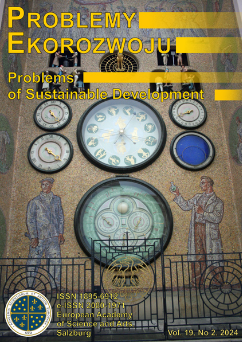Environmental ethics from a Thomistic-personalistic perspective (implications for the sustainable development concept)
Mariusz Ciszek
University of Natural Sciences and Humanities in Siedlce, Institute of Social Sciences and Security, Żytnia 39, 08-110 Siedlce (Poland)
Abstract
According to the author, Thomistic environmental ethics is the ethics of respect for man and nature. Contrary to popular opinion it doesn’t possess a strong anthropocentric nor a non-ecological character but a theocentric one with a pro-ecological dimension. Thomism teaches that there is hierarchical order in reality. In Thomistic ethics it is God who is the main reference point and the supreme good (summum bonum). Thus, it has a primarily theocentric character, and secondarily an anthropocentric one, which is inscribed in relations between humans and other beings. However, this anthropocentrism is moderate and is not hostile towards nature. In theocentric terms, God is the cause and source of all natural beings. From the ontological perspective they are therefore good, and which must be protected. However, from this assumption it does not mean that all natural beings have the same axiological value. In Thomistic eco-ethics a man, understood as a human person, has an autotelic value. Currently, for this reason, traditional Thomism is increasingly supplemented with personalistic reasoning. In anthropologic analysis a man appears as a psychophysical being. He is therefore unique and the most perfect of beings occurring in nature. Only man can be described as a free and rational being, transcending nature which surrounds him. That is why the dignity of a human person is considered as the moral norm of Thomistic eco-ethics. It also has a person-centric dimension. The value of a human person also controls the relations between a person and other beings inhabiting the Earth. However, they cannot be based on the idea of human domination over nature. The duty to protect nature is inscribed in natural law. This understanding of Thomistic-personalistic eco-ethics can be reconciled with the sustainable development concept.
Keywords:
environmental ethics, sustainable development, environmental protection, (eco)Thomism, (eco)personalismReferences
ANDRZEJUK A., Człowiek i dobro, http://www.tomizm.pl/?q=node/9#1 (1.08.2012).
Google Scholar
ANZENBACHER A., Wprowadzenie do filozofii, Unum, Kraków 1992, p. 127-128.
Google Scholar
BAJDA (BAYDA) J., Grzech ekologiczny, in: Ochrona środowiska w filozofii i teologii, ed. Dołęga J. M., Czartoszewski J. W., ATK, Warszawa 1999, p. 222-242.
Google Scholar
BIESAGA T., Tadeusza Ślipko uzasadnienie norm chroniących przyrodę i zwierzęta, in: Żyć etycznie żyć etyką, ed. Janusz R., WAM, Kraków 2009, p. 51-58.
Google Scholar
BOCHEŃSKI J. M., ABC tomizmu, Veritas, Londyn 1950.
Google Scholar
CISZEK M., 2006, Teocentryczny model etyki środowiskowej, in: Studia Ecologiae et Bioethicae, vol. 4, p. 141-156.
Google Scholar
CISZEK M., 2007, The Idea of Theocentrism in The Catholic Environmental Ethics, in: Studia Ecologiae et Bioethicae, vol. 5, p. 173-178.
Google Scholar
CISZEK M., 2008, Etyczne podstawy polityki zrównoważonego rozwoju, in: Studia Ecologiae et Bioethicae, vol. 6, p. 153-163.
Google Scholar
CISZEK M., Teocentryczny model etyki środowiskowej oraz jego implikacje w kulturze bezpieczeństwa ekologicznego i ekorozwoju, PTF, Warszawa 2009.
Google Scholar
CISZEK M., Bezpieczeństwo i prawa człowieka w dziedzinie etycznych problemów ludzkiej prokreacji, DUET, Toruń 2011, p. 37-40.
Google Scholar
CISZEK M., Filozofia ekologii rodziny ludzkiej w systemie środowiska społecznego, kulturowego i przyrodniczego. Studium społeczno-filozoficzne z zakresu bezpieczeństwa ekologicznego, UPH, Siedlce 2013, p. 240-241.
Google Scholar
CZARTOSZEWSKI J. W., Ekologiczne rachunki sumienia, in: Ochrona środowiska w filozofii i teologii, ed. Dołęga J. M., Czartoszewski J. W., ATK, Warszawa 1999, p. 243-251.
Google Scholar
DOGIEL G., Antropologia filozoficzna, ITKM, Kraków 1992, p. 15.
Google Scholar
DOŁĘGA J. M., 2007, Systemy wartości w zrównoważonym rozwoju, in: Problemy Ekorozwoju/Problems of Sustainable Development, vol. 2, no 2, p. 41-49.
Google Scholar
DZIEKOŃSKI S., Wychowanie ekologiczne w religii chrześcijańskiej, in: Podstawy kultury ekologicznej, ed. Dołęga J. M., UKSW, Warszawa 2002, p. 69.
Google Scholar
GAWOR L., Teocentryzm (entry), in: Mały słownik etyczny, ed. Jedynak S., Branta, Bydgoszcz 1999, p. 265.
Google Scholar
JAROSZYŃSKI P., Etyka – dramat życia moralnego, in: Krąpiec M. A., Kamiński S., Z. J. Zdybicka, Maryniarczyk A., Jaroszyński P., Wprowadzenie do filozofii, RWKUL, Lublin 2003, p. 552.
Google Scholar
KŁÓSAK K., 1960, Zagadnienie pochodzenia duszy ludzkiej a teoria ewolucji, in: Roczniki Filozoficzne, vol. 8, no 3, p.120-121.
Google Scholar
ŁUKOMSKI J., Podstawy chrześcijańskiej etyki środowiska naturalnego, in) Ochrona środowiska w filozofii i teologii, ed. Dołęga J. M., Czartoszewski J. W., ATK, Warszawa 1999, p. 179-180.
Google Scholar
ŁUKOMSKI J., Próba zbudowania chrześcijańskiej etyki środowiska naturalnego, Jedność, Kielce 2000, p. 297-301.
Google Scholar
OZOROWSKI M., Teologiczne podstawy kultury ekologicznej, in: Podstawy kultury ekologicznej, ed. Dołęga J. M., Uniwersytet Kardynała Stefana Wyszyńskiego, Warszawa 2002, p. 45.
Google Scholar
PAWŁOWSKI A., Rozwój zrównoważony – idea, filozofia, praktyka, Monografie Komitetu Inżynierii Środowiska PAN, vol. 51, KIŚ, Lublin 2008.
Google Scholar
PODREZ E., Etyka ogólna. Moralne podstawy działania człowieka (skrypt akademicki), http://www.filozofia.uksw.edu.pl (20.08.2012), p. 78.
Google Scholar
SŁOMKOWSKI A., Problem pochodzenia człowieka, Pallotinum, Poznań 1957, p. 192-204.
Google Scholar
STĘPIEŃ A. B., Wstęp do filozofii, TNKUL, Lublin 1995, p. 239-240.
Google Scholar
SZOSTEK A., Pogadanki z etyki, Niedziela, Częstochowa 1998, p. 59.
Google Scholar
ŚLIPKO T., 1994,, Prawo naturalne jako podstawa szacunku człowieka dla życia i przyrody, in: Ethos, vol. 7, no 1-2 (25-26), p. 101.
Google Scholar
ŚLIPKO T., ZWOLIŃSKI A., Rozdroża ekologii, WAM, Kraków 1999, p. 123-135.
Google Scholar
WICHROWICZ C. J., Zarys teologii moralnej w ujęciu tomistycznym, M, Kraków 2002, p. 267-268.
Google Scholar
WOJTYŁA K. (1970), Notatki na marginesie konstytucji Gaudium et spes, in: Ateneum Kapłańskie, no 74, p. 4-5.
Google Scholar
WOJTYŁA K., Miłość i odpowiedzialność, TNKUL Lublin 2001, p. 43.
Google Scholar
ZABŁOCKI G., Rozwój zrównoważony: idee, efekty, kontrowersje (perspektywa socjologiczna), UMK, Toruń 2002, p. 7.
Google Scholar
ZIĘBA S.., Pochodzenie człowieka w aspekcie filozofii przyrody, in: Encyklopedia katolicka, vol. 3, ed. Łukaszyk R., Bieńkowski L., Gryglewicz F., TNKUL, Lublin 1995, p. 886.
Google Scholar
Authors
Mariusz CiszekUniversity of Natural Sciences and Humanities in Siedlce, Institute of Social Sciences and Security, Żytnia 39, 08-110 Siedlce Poland
Statistics
Abstract views: 16PDF downloads: 6
License

This work is licensed under a Creative Commons Attribution-ShareAlike 4.0 International License.




